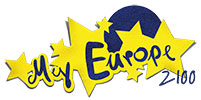“Europe is our future, we don’t have another one!” What former German Foreign Minister Hans-Dietrich Genscher said about Europe, is now repeated by politicians of all parties. But what does Europe exactly mean? A collection of paragraphs based in Brussels? The economic elite of every European country, knows about the importance of the European Union, but what about the rest of the European population? Despite various efforts, the people of Europe are still not really fascinated by the European idea.
Curiously, the older people feel more passionate for Europe than the younger generation. Maybe because they remember the two world wars and great Europeans like de Gaulle and Adenauer or Mitterrand and Kohl. Younger people are not interested – at least most of them.
Why is that? And what can we do to reverse this trend?
Europe’s problem is that it is perceived only as a sum of all European countries. There is hardly anyone who says he feels as a European. Europe is – if ever – perceived as a necessary construction, but not as a culturally developed union. Hence, there already is a European identity. Especially compared to the United States, to China or to India, you can quickly see that Europe is not just a theory. Europe is social. Europe does not torture. Europe is enthusiastic for football. Europe is democratic and: Europe is peace! If we want the people to “feel” European, it is not important to appeal to the heads, but to the hearts of men. It is important to create not only elitist projects such as the “European Capital of Culture”, but to create projects for everyone.
Let’s begin with the fact that Europe has no face. We need a European president, elected by the “People of Europe”. A president, who travels around Europe and listens to the people instead of someone chosen secretly in the backdoor rooms of Brussels. Whether this president has real power or only a representative function is initially unimportant. Only the electoral process would already be a European event, and countries that have little to do with each other, such as Portugal and Denmark would have a common subject, which would bring them a bit closer.
In addition we need European media. Europe needs its own TV channel – certainly, not a parliamentary TV program, but an entertaining station for the ordinary citizens. We need a broadcaster like the Austrian ORF1 or British BBC showing the Champions League and a European “CSI” from Rome, Athens or Paris. With a European TV channel, people would have something more in common – something to discuss the next day (“Hey, have you seen the Italian woman yesterday at Europe’s Next Top Model ..?”) And this is what makes people grow together. Not to mention that with the millions of viewers you can have production budgets, which could easily compete with the U.S. Super Bowl.
The list of possibilities for more cultural identity can be continued endlessly.
– Why is there no European holiday? Certainly, there is an official European Day of Languages, but since this day is not a holiday, it is not rooted in peoples’ minds. A free day for every citizen of Europe gives by its very existence a sense of European unity, which is missing so much.
– Why don`t our European Olympic Champions wave the European flag next to the flag of their country at the awards ceremony? If European Olympic medals would be summed up in the country statistics, people would see very quickly how strong Europe really is.
-Why is there so little exchange between pupils within Europe? Pupil exchange programs are not very expensive, because parents look after the children of each other. With those programs young 4 students could develop a feeling that they belong to something bigger than their own state. Living a few months in another country, they can get to know a different culture. This creates deep bonds at the family level that may last a lifetime and helps to understand other countries and cultures. By the way… the young students would easily learn a new foreign European language.
Now, many skeptics will reply that people will lose their national identity with measures like these. But this is simply not true – It is the opposite: Anyone who has ever lived for some time abroad, knows that especially in a foreign country you realize, how much you have national habits and how many little things you suddenly miss from your home country. Just by getting to know other cultures, the sense of one’s own culture is strengthened. It’s about time – Time to anchor Europe not only in the minds, but also in the hearts.
